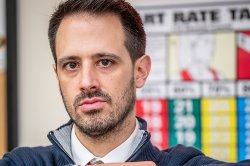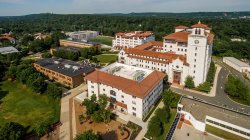Peter Hosick
Assistant Professor, Exercise Science and Physical Education
Posted in: Spotlights

What was your college experience like?
I stayed relatively close to home for my undergraduate degree. I didn’t commute though, both my parents and I wanted me to have a more traditional college experience. I was a health and physical education major right from the start, but by my junior year, the plan of teaching and coaching for a middle or high school changed. I knew I wanted to do something in the health and fitness field but wasn’t exactly sure what that was until sometime later.
After I finished my undergraduate degree I moved to North Carolina where my parents had moved a year or two earlier. I took some time away from school before starting my master’s degree. During that time, I worked as a substitute teacher, a part-time remedial math and reading instructor, a sales associate for the Gap and General Nutrition, and even spent a summer working as a lifeguard for the city of North Myrtle Beach, SC. At one point, I was pretty close to buying an ice cream shack footsteps off the beach and seeing where that took me. However, I returned home and eventually found my way to Appalachian State. I received a graduate assistant position there. Working as a GA and the mentorship I received as a result, was what led me to become a professor. I really enjoy research and exploring the answer to things no else knew. Then, through a connection from Appalachian State, I was accepted into a PhD program at the University of North Carolina. While there, I studied the effect that fitness has on metabolic and endocrine dysfunction in overweight and obese children and adolescents.
I was 25 years old when I finally realized that I wanted to become a professor and teach and research at the college level. Once that happened it became my focus. I jumped at every opportunity I had to learn and get involved in research and teaching. It was very exciting for me.
Did you go to college with the intention of being a professor? If not, how did your path bring you here?
I did not. I knew I wanted to teach and help others reach their goals, but like many people, I needed a little refining through experience and mentorship to find my ultimate goal. I was lucky that my initial goals were within the same general field as to where I ended up. At first, I wanted to be a high school health and PE teacher and coach. I don’t remember exactly what it was that transitioned my focus away from that, but at the end of my undergraduate degree, I wanted to be a college strength and conditioning coach. I started my master’s degree with that as my goal. A combination of bad experiences, true mentorship, and finding my real passion shifted my attention to becoming a professor.
What is one thing you wish you had known in your undergraduate/graduate career? Why?
I wish I’d known that every assignment, quiz, or exam isn’t quite as important is it seemed at the time. Performing well in class is important, but learning through experiences can be much more valuable and meaningful in the long term. For example, you can learn a lot more by getting involved in research or attending a professional conference then you can by reading about something in a textbook. The people you meet and the conversations you have through those experiences will likely be much more meaningful in the long run than getting a B versus an A on your next exam.
What is the best part about being an MSU faculty member?
From the very beginning of my search for a career, I wanted to help people reach their goals. So I would say the best part of being a faculty member at MSU is mentoring students to figure out what they want to be and helping them get there. I love hearing from former students about all the wonderful things they are doing. It really makes all this work seem worthwhile.
What does a typical day look like for you?
Typical days for me don’t exist. That’s also one of my favorite things about being a professor. Some days are focused on teaching in which I meet with students, lead classes, or work on lectures. Others are all about my research. On those days, I’m probably in the lab, but that can also mean I’m in my office trying to make sense of some data. Many times on research days, I’m planning future projects or troubleshooting a problem (which is surprisingly fun to solve). Still, on other days I might meet with faculty to discuss how we can make our program better. It’s hard to keep it all straight, but it also ensures I never get bored!
What are a few of your recent accomplishments?
My oldest son recently earned his orange belt in tae kwon do, which is by far my most favorite accomplishment to discuss with others. Professionally speaking, I was recently rewarded tenure and promotion. That was a long-term goal since I realized I wanted to be a professor about 14 years ago. I am also excited about leading a group of 18 Montclair State students to Australia this summer. While there, we will be learning about athlete monitoring and testing for sport performance at the University of the Sunshine Coast. I’m also proud to say a former graduate student of mine recently had their research project accepted for publication in The Journal of Sports Medicine and Physical Fitness. Along with another graduate student, we developed a follow-up study and are currently in the midst of data collection for that study. Lastly, I have received two invitations to discuss my research at professional conferences this year. I am excited about these invitations as they indicate recognition of my work. I hope that this will bring more recognition to the Montclair State Exercise Science and Physical Education department and all the great things our faculty and students are doing.
What is your favorite class to teach at MSU? Why?
That’s hard to say. All the classes I’ve taught have been fun, unique, and challenging in their own way. Last spring I taught a Fitness Activities class, which is a freshmen level activity course. That was fun because I got to introduce new activities and play with the students as they learn about the foundations of exercise. Physiology of Exercise is one of our main classes and I get to talk about a lot about physiology, which is my passion, but it is a lot of information and can be difficult at times. Exercise for Special Populations is for upperclassmen and I get to let them apply a lot of the knowledge they’ve learned previously in new and unique ways. It’s fun to see them develop their own ideas about topics. I think what really makes a class fun to teach is having a group of motivated students that come to class with energy and willingness to discuss the topic of the day.
What advice would you give to incoming students in order for them to succeed?
Get invested. You get out of your educational experience what you put in. By that, I don’t mean you have to send countless hours studying (although that may help). A few examples are:
- Get to know your professors – If you have one that seems nice in class go to their office hours and pick their brain about a question you have, any question. I enjoy it when my discussions with students go beyond what we talked about it class.
- Attend an event – There are countless concerts or sporting and other cultural events going on around campus (many free to students). Go to a few and see what you think.
- Get involved – join or start a club/interest group/activity you like or are interested in learning more about. Chances are you’ll meet likeminded people that become good friends.
- Find a job – Many departments (ESPE included) and offices around campus hire students to help in various ways. You learn a lot about what’s going on and get paid.
